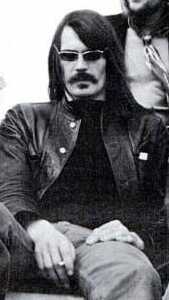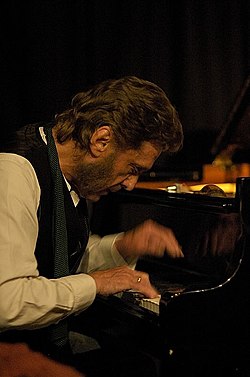Top Qs
Timeline
Chat
Perspective
List of Soft Machine and spin-off band members
From Wikipedia, the free encyclopedia
Remove ads
Soft Machine are an English jazz-rock[1] band from Canterbury. Formed in mid-1966, the group originally consisted of drummer and vocalist Robert Wyatt, guitarists Daevid Allen and Larry Nowlin, bassist and vocalist Kevin Ayers, and keyboardist Mike Ratledge. The current lineup of the band features guitarist John Etheridge (1975–1978, 1984 and since 2015), saxophonist, keyboardist Theo Travis (since 2015), bassist Fred Baker (since 2020) and drummer Asaf Sirkis (since 2022).
Remove ads
History
Summarize
Perspective
Original drummer Robert Wyatt was the first and only lead vocalist for Soft Machine. After his departure in 1971, the group became entirely instrumental.
Original run
Soft Machine were formed in mid-1966 by drummer and vocalist Robert Wyatt, guitarists Daevid Allen and Larry Nowlin, bassist and vocalist Kevin Ayers and keyboardist Mike Ratledge. Wyatt, Allen and Ratledge had first worked together in 1963 as the Daevid Allen Trio,[2] after which Wyatt and Ayers co-founded the Wilde Flowers in late 1964 and Mister Head in early 1966, the latter with Allen and Nowlin. Mister Head was short-lived and in mid-1966 Wyatt, Ayers, Allen and Nowlin joined Ratledge to form Soft Machine. Nowlin's time with the band was brief, leaving less than two months after the band formed, reducing them to a quartet.[3] Soft Machine released a single, "Love Makes Sweet Music", in February 1967. Six months later they were reduced to a trio, when Allen, an Australian, was denied re-entry to the UK following a tour of France, after overstaying his visa.[4] Wyatt, Ayers and Ratledge recorded Soft Machine's self-titled debut album in April 1968, which was issued at the end of the year.[5] After the album's completion, Andy Summers joined the band on guitar, though he left after just two months returning the band to a trio.[6] After a final American tour, opening for the Jimi Hendrix Experience, Ayers left Soft Machine in September 1968.[7]
Wyatt and Ratledge rebuilt Soft Machine in December 1968 with Hugh Hopper replacing Ayers on bass. Another former member of the Daevid Allen Trio and the Wilde Flowers, Hopper had previously guested on Soft Machine's debut album. This new lineup recorded Volume Two during early 1969, and eventually released in September that year.[8] After guesting on the Volume Two sessions, Hopper's brother Brian Hopper, another Wilde Flowers founder, joined the band on saxophone in May 1969. After five months, Brian Hopper departed, with Wyatt, Ratledge and Hugh Hopper expanding the band to a septet with the addition of a four-piece horn section: saxophonists Elton Dean and Lyn Dobson, cornet player Mark Charig and trombonist Nick Evans.[9] Both Charig and Evans left after two months due to "financial and logistical challenges", while Dobson also left the band in March 1970.[9]
After the release and promotion of Third and Fourth, Wyatt was fired in August 1971. Wyatt's replacement was initially Australian drummer Phil Howard. However, after half of the next album Fifth was recorded, Howard himself was replaced by John Marshall. After Fifth was completed, Dean also left in mid-1972 and was replaced by Karl Jenkins, a former bandmate of Marshall's in Nucleus.[10] The group issued Six the next year, which was Hopper's last album before departing in May 1973.[11] He was replaced by Roy Babbington, another former Nucleus member who had previously worked with Soft Machine as a session musician, playing double bass on Fourth and Fifth.[10] In November 1973, the group became a quintet again with the addition of Allan Holdsworth (another Nucleus alumnus) as their first guitarist in five years.[12] This lineup recorded the album Bundles and managed to stay together until April 1975, when Holdsworth departed. He recommended John Etheridge as his replacement.[13] At the beginning of 1976, saxophonist Alan Wakeman was added, at which point Jenkins stopped playing saxophone and oboe and focused solely on keyboards.[14] In March 1976, the band were left with no original members when Ratledge chose to leave.[15]
After Elton Dean's departure in 1972, he was replaced by Karl Jenkins (pictured) who would later become band leader.[16]
After the release of Softs in 1976, Soft Machine's lineup continued to change regularly. Wakeman left in July, just after the album's release,[17] and was replaced briefly by Ray Warleigh, who had worked with the band previously as a session player on Bundles.[18] For a European tour later in the year, Ric Sanders joined on violin and Percy Jones of Brand X took over from Babbington, who had suddenly quit.[19] Jones declined to join on a full-time basis and was replaced by Steve Cook. Live shows in 1977 spawned the band's first completely live release, Alive & Well: Recorded in Paris.[20] After a final show in December 1978, as a quartet without Sanders and with Allan Holdsworth returning to replace Etheridge,[21] Soft Machine disbanded and members went their separate ways.
Occasional reunions
The Soft Machine name was briefly revived in 1980 for Land of Cockayne.[22] In the summer of 1984, Soft Machine reformed once again for a short run of shows at Ronnie Scott's Jazz Club, with the band comprising John Marshall, Karl Jenkins, Ray Warleigh, John Etheridge, Paul Carmichael and Dave MacRae.[23]
Early spin-off bands
In 1978, former Soft Machine bassist Hugh Hopper and saxophonist Elton Dean formed the spin-off band Soft Heap, with former National Health keyboardist Alan Gowen and drummer Pip Pyle.[24] For their first tour, Pyle was temporarily replaced by Dave Sheen due to other commitments, and the group (renamed Soft Head) issued the live album Rogue Element by the end of the year.[25] With Pyle back on drums, the band recorded a self-titled debut album in late 1978, which was issued early the following year.[26] National Health's John Greaves later replaced Hopper and guitarist Mark Hewins joined after Gowen's death in 1981, with this second incarnation recording the live album A Veritable Centaur released in 1995.[27] A live album recorded by the original Soft Heap lineup of Hopper, Dean, Gowen and Pyle in 1978 was released as Al Dente in 2008.[28]
Hugh Hopper and Elton Dean formed a number of Soft Machine spin-off bands during the 1990s and 2000s, including Soft Bound (pictured).
Later spin-off bands
Over ten years after the last Soft Machine spin-off band, Hugh Hopper and Elton Dean formed Soft Ware in 1999, adding former Soft Machine drummer John Marshall and former King Crimson contributor Keith Tippett on keyboards.[29] The group did not release any albums, and by 2002 had changed their name to Soft Works as Tippett left and former guitarist Allan Holdsworth joined.[29] Abracadabra, the band's only studio album, was issued in 2003.[30] Holdsworth left again after the album's release and was replaced in October 2004 by his original replacement in Soft Machine, John Etheridge; at this point, the band renamed themselves Soft Machine Legacy.[29] During the final Soft Works tour, Hopper and Dean also recorded an album with Japanese keyboardist Hoppy Kamiyama and drummer Tatsuya Yoshida under the name Soft Mountain.[31] In 2004, they completed a tour with French keyboardist Sophia Domancich and drummer Simon Goubert under the name Soft Bounds.[32]
The first lineup of Soft Machine Legacy released Live at Zaandam in 2005, followed by a self-titled debut studio album and the live video New Morning: The Paris Concert the following year.[29] On 7 February 2006, however, Dean died following a year of "heart and liver problems".[33] His place in the band was taken by Theo Travis, and in January 2007 the group issued their second studio album Steam.[29] In June 2008, Hopper was diagnosed with leukemia and temporarily replaced on tour by Fred Baker of In Cahoots.[8][34] He later died of the condition on 7 June 2009.[35] As had happened when Hopper left Soft Machine in 1973, his place was taken by Roy Babbington.[36] In 2010, the band issued the live collection Live Adventures recorded in 2009, which was followed in 2013 by their third studio release Burden of Proof.[29]
Soft Machine returns
Starting in December 2015, Theo Travis, John Etheridge, Roy Babbington and John Marshall began touring as Soft Machine, dropping "Legacy" from their name.[13] The band released their first official studio album under the original name since 1981 in the form of Hidden Details in September 2018. In December 2020 Fred Baker replaced Babbington.[13] In August 2022, Asaf Sirkis replaced newly retired John Marshall.[37][38] A new studio album, Other Doors, was released in June 2023. The album was recorded with Marshall before his departure.
Remove ads
Soft Machine members
Current members
Former members
Remove ads
Other Soft Machine musicians
Touring substitutes
Session musicians
Spin-off band members
Remove ads
Other spin-off band musicians
Touring substitutes
Session musicians
Remove ads
Soft Machine timeline

Spin-off band timeline

Soft Machine lineups
Remove ads
Spin-off band lineups
Remove ads
References
External links
Wikiwand - on
Seamless Wikipedia browsing. On steroids.
Remove ads

































